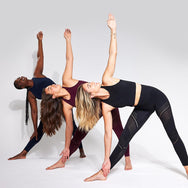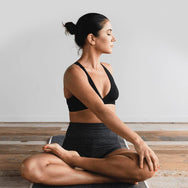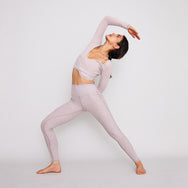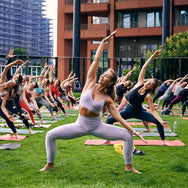Words by Puravi Joshi

In the past few years words like Mindfulness & Meditation have almost become #trending. When we think of the global pandemic we are currently in, it’s also really important to be aware that we are in a global mental health crisis too. More and more people were prescribed antidepressants last year than ever before and the need for mental health support became even more apparent.
Towards the end of last year the app Headspace launched its exclusive series with Netflix, which was a huge breakthrough for the Meditation and Mindfulness Field. This particular part of the Wellness Industry is predicted to be worth 2 billion dollars by 2022. Apps such as Headspace and Calm have made it possible for us to have access to these tools in an easy, accommodating way.
WHY IS MEDITATION BECOMING POPULAR?
When I think of the word “meditation”, I immediately relate it to the image of Buddha sitting quietly with his eyes closed under a tree. And if we relate that image to today’s society in the western world, I’m pretty sure most people will say ‘I don’t have time to sit quietly in my own house let alone outside in nature.’
Meditation was first found in ancient Indian scriptures; The Vedas, it was referred to as Dhyana which in Sanskrit means ‘the training of the mind’. There are also early findings of meditation dating as far back as the 3rd century BC in China that are linked to the ancient Chinese philosopher, Laozi.
If we take the concept of Dhyana, the training of the mind, it's first really important to dig a little bit deeper into the mind. Our minds are incredible things, they process approximately 70 thousand thoughts every day, and that is only using 3-5% of our conscious minds. Out of these 70 thousand thoughts, 80% are repetitive and approximately 90% are negative. When I found this out I became a lot more aware if or not the thoughts running through my mind were ones I’d already had and would automatically try to like Taylor Swift ‘shake it off’. These thought patterns can prevent us from cultivating a peaceful trail of thought and instead can cause heightened stress and anxiety.
This is where meditation can come in. It is a great tool to have to help balance these thought patterns and help us to feel more grounded and relaxed.

SO, WHAT EXACTLY IS MEDITATION?
Meditation is the process of finding internal stillness. It is a specific technique that rests the mind and helps us attain a consciousness that is completely different to our ‘normal waking state’. When we meditate, we are fully awake and alert, however our minds are not focussed on the external world, instead meditation is an internal practice. The point of meditation is not to clear your mind and have zero thoughts. It is to be able to find stillness within even though these thoughts are present.
HOW DO I MEDITATE?
If it’s your first time meditating you might find it odd to find yourself in silence and just be with your thoughts and feelings, this can feel overwhelming and uncomfortable, we live in such a fast-paced society, that we tend to be rushing through the present moment, sometimes not even recognising and taking in the here and now and instead focussing on what we need to do next. Funnily enough, your innermost thoughts and feelings are the things your mind tends to resist and ignore.
The first time you meditate it is normal to feel distracted and your mind busy and restless, please don’t get put off by this and if on your first go you don’t immediately experience a state of calm and tranquillity, it doesn’t happen overnight and is very much a process. Even people with a consistent meditation practice can have off days where they are unable to sit in meditation for as long as they are normally able to, it’s important to note that every day in meditation will be different, no matter how long you have been doing it.
To have a meditation practice you don’t need anything more than yourself, there are no special clothes you need just whatever you feel comfortable in. All you have to do is find a comfortable place to sit, close your eyes and just breathe, your mind will do the rest.
To make it more of an experience you can designate a space for yourself to meditate, ensuring it is cosy and clean and there is no clutter around, I truly believe that a cluttered space will give you a cluttered mind. You might even choose to light a candle or incense, to create a nice atmosphere. When meditating, there is nothing to achieve apart from stillness, there are no goals or targets. It’s just about finding a place of internal calm where you’re not forcing it to happen, you’re there effortlessly.

OBSTACLES TO MEDITATION
It is impossible for you to have a bad meditation. The minute you start to question whether you are meditating correctly or not, you switch from sitting quietly with non-awareness to a state of awareness, when this happens it is important to come back to your breath and focus solely on your inhalations and exhalations and then let your mind go back to being free. There’s no set time for how long you should meditate. You might find yourself in instances where you can only manage 5 minutes and other instances where you find yourself there for an hour and it feels like no time has passed.
Whilst meditation isn’t a quick fix to your problems. What meditation can do is help you manage how you choose to react and how you view all the events happening to you and around you. It allows you to find stillness amongst chaos. With a consistent meditation practice, the change to you can be profound. It helps build awareness and understanding, not only about yourself but with others too.
MEDITATION EXERCISE FOR BEGINNERS
To get into a good meditation practice, consistency is key. Commit to a regular practice whether it's 5 minutes, 15 minutes or even an hour, or whether its daily or weekly. Choose a place where you won’t be disturbed by a lot of noise, this will help you to establish routine within your meditation practice. Lots of people find meditating first thing in the morning before they get out of bed and before they brush their teeth an easy way to make this a part of their routine. Give it a go, 5 minutes in meditation first thing in the morning might be just the thing you need to set yourself up for the rest of your day!






























































